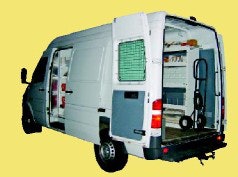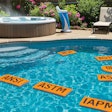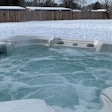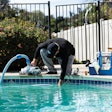
Efficiently run businesses generate more revenue. To a service business, a clean, organized truck or van that visits plenty of pools each day is a major vehicle for achieving financial goals. If your truck is a disorganized mess you have to dig through at every stop to find the parts you need, you're going to get less done each day and you're going to make less money. But that's not you. Or if it has been, you're ready to tidy up, organize and earn more money. First, you want to be sure you're using the best vehicle for your needs, and then you should establish and use some system of organization for all the various parts you carry. You'll also want your vehicle(s) to be on the road burning gas as little as possible — in other words, have an efficient schedule for all routes.
What size truck or van?
Only you can determine the best vehicle for your company and how you want it organized because you know your needs best, though the thoughts AQUA got from a few industry veterans can help you with these decisions.
Mike Mitchell, owner of Pool Sharks in Dallas, and a past president of the Dallas IPSSA chapter, likes his Dodge Sprinter van. "It's that real tall European-looking van that you can actually stand up in and walk down the center of," he says. "It certainly holds a lot and keeps parts and supplies out of the weather, and you can secure it a lot easier than having an open bed."
A tech who does just repairs, and specializes in heaters and controls, Mitchell has bins on either side of the center aisle in his van with different types of containers in the bins. "I have bins with different heater parts and a section that has miscellaneous electrical parts: GFCIs, switches, covers," he says. "I also put PVC fittings in milk crates; different sizes go in different buckets. I've got that pretty organized so you don't have a bunch of 1-inch fittings in with 2-inch fittings. Because a lot of what we do is fixing leaks at equipment pads, I also have a large selection of mechanical seals, shaft seals of different gaskets for the various pumps, seal-plate gaskets and diffuser O-rings.
"I always replace the seal and gasket at the same time, but for certain style pumps we work on, I usually keep a seal plate and typically a couple of different pump housings," adds Mitchell.' "Oftentimes, you'll show up on a job and the problem might be a cloggedup impeller because somebody has been using a pump basket that's cracked or broken. And you can fix the problem, but if you don't replace the basket, it's going to cause the problem again. Plus, if they're needed, replacing items like pressure gauges and pump baskets and skimmer baskets and skimmer lids can add a lot of extra revenue at a service call."
While he doesn't stock many large items, Mitchell does keep a set of 48square-foot and 60-square-foot nautilus-style grids in his van because he often discovers that a grid or a set of grids needs replacing when he services or cleans a filter. In addition, Mitchell carries "a pretty extensive set of manuals for all the manufacturers. If I have a problem, I can go straight to a book. I also keep a computer in there with a printer so I can do my invoicing right there, and this saves me a whole lot of time.
"Experience has taught me what I need to have and what I don't," adds Mitchell. "You can't keep every part on your truck, but you should have a pretty good idea of the kind of things you're running into."
Dave Hawes, owner of H & H Pool Service in Dublin, Calif., says experience has also taught him what he needs to have on his fleet of vehicles. For service vehicles, he likes to use smaller long-bed trucks for two reasons. "No. 1 is fuel efficiency and number two is we don't have the back issues with guys reaching into a full-size vehicle to try to drag out equipment. These vehicles are stocked with the type of pump baskets, pool sweep parts and O-rings and things that would outfit them for probably 75 percent of the pools they do. You'd have to drive around a semi truck to be outfitted with everything for everybody.
"Our repair techs drive a utility-bed pickup with all the different compartments in the flip tops on top where they can separate everything and make it easier to find whatever they need," says Hawes. "All that goes into the mix of being efficient with your vehicle. All too often, you see these guys out by the curb, pulling out mounds of parts, looking for that one little thing that's at the bottom.
"On my truck, I carry just about everything. I could probably build a heater out of my truck. And, boy, if you want to hear me scream, just be within a mile of a job that I don't have a part for on my truck."
Beyond the wasted time, another reason Hawes gets upset if he doesn't have the parts he needs is because he has a system in place to help determine what he or his employees should have before they arrive at each call.
"It's important to prescreen your calls," he says. "When a customer calls in and says, 'I have a pump that's not running,' get the information from the pump. Find out what kind of pump it is, what the horsepower is and be a little more inquisitive about what the homeowner is seeing and hearing. Really try to determine what's going on and what parts you'll need when you get there. I like to make one-stop repairs, and I'm constantly seeing guys in the distributor who have cut out an entire pump to bring it in to say, 'I need a seal for this,' and there's the suction and discharge plumbing cut off, and the conduit is still hanging on to the motor. I think, 'Wow, had you maybe asked a few questions, you might have saved yourself a second trip and certainly the cost and time and effort of putting that pump back in.'
"So we really try to prescreen, and part of that is when we put a pool on service, we have an information page in our computer for that particular account that delineates the pump and its horsepower, the filter and its size, the heater and the type and size of the heater, all of that. Creating these records and prescreening allows you to be efficient because you're making one trip for the most part, and it allows you to look as professional as you possibly can. When the customer says, 'Wow, you have that part.', you'll be able to respond, 'Well, of course I do. I knew you had a Laars heater, so those are all the parts I brought out.'"
Even More Choices
Larry Hayes, president of Anchor Spa & Pool in Huntley, Ill., prefers pickup trucks outfitted with side boxes so all needed parts, chemicals and equipment can be easily accessed. To avoid using larger-than-necessary trucks, Hayes uses trailers for the opening and closing seasons. "A lot of times guys get these huge, gas-guzzling trucks, and they drive them around all year because they need the extra space during the opening and closing season," says Hayes. "To economize, we use smaller trucks and attach 5-by-8foot trailers with a drop door in the back — it's like a ramp. The trailer carries all the things that are peculiar to the opening or closing season. We'll also use wagons that we load up with everything that needs to be taken out to the job site: the pump for vacuuming, the chemicals, the vacuum hoses, all the cleaning utensils. So the guys just roll that right out of the trailer down the ramp door and wheel it into the backyard and they've got everything they need. They're not making 20 trips back and forth to the truck."
In terms of organizing parts and supplies within the vehicles, Hayes uses tackle boxes, and so does Hawes. "So we have, for example, a tackle box for automatic pool cleaner parts, and that box will have at least two of each part, and then we've got one for heaters and one for pumps," says Hayes. "The tackle boxes really help in organizing the truck."
Hayes finds these boxes at sporting-goods stores, and he looks for ones with deep trays — at least 1 inch deep. "And, most tackle boxes are weatherproof," he adds. "So, even if you have an open-bed truck, when the box is closed, your stuff is going to stay dry."
In addition to the equipment parts he most often needs, Hayes stocks his vehicles with commonly used chemicals. "If you're going to be efficient, you need to think about the law of averages," he says. "So that means if I'm going out today and I've got 10 stops, what am I going to need the most of? That's probably going to be a chemical need. So we carry a certain amount of chemicals so we can take care of any chemistry problem while we're at the home. We definitely carry pH-, alkalinity- and hardness-adjusting chemicals because those are usually the most neglected by the homeowner."
Hayes, Hawes and Mitchell all stressed the importance of regularly monitoring truck inventory. "Keep a log indicating when you sell something out of your truck," says Mitchell. "And next time you're at the supplier, reorder it. Put it back on your truck because you're going to need it."
Says Hawes, "We go through our trucks about every quarter to determine which items we're carrying around that we've had absolutely no need for so that we can remove those and put on the parts for the more-current equipment that's out there."
Hawes also has a system in place for ordering parts. "We have a parts order list," says Hawes. "As parts are used off a truck, that part is not only delineated on the work order, but it's also delineated on the order sheet. And then at the end of the day, I'll order the needed parts, if they're not already in our office inventory, and they'll be waiting for the tech the next morning at the will-call counter at the distributor. This way, my techs don't have to waste time standing in line, waiting for their turn. We want to be as efficient as possible."
Efficient Routing
With the price of gas these days, wellplanned routes are essential. Simply put, you should schedule stops so you spend the least amount of time on the road and most of the time on the job, says Hayes.
Says Hawes, "I even take into account when schools let out, so I don't have a guy sitting on a street for 30 minutes trying to get through traffic from high schools letting out. I also consider commuter traffic, so we're not fighting that. All of that is built into my scheduling so that we get the most efficient use of our technicians, and they're not waiting 20 minutes to make a left turn."
Waiting in traffic is certainly frustrating, almost as much as arriving at a backyard only to encounter a locked gate. To be sure his techs can get access to pools, Hayes lets homeowners know when to expect a tech will be out to fix problems, and his employees call every homeowner as they drive to the next job. "Then, when they're done at that house, they are to let the homeowner know what they've done and that they're leaving. And if they're not home, they are to call them and leave a message with that information, if necessary. This way, you're not going to get to the office each morning and have 10 calls about the day before with people wanting to know when you were at their house and what you did there."
Because communicating with customers effectively is so important, Hawes is trying to get e-mail addresses for his clients since that can be a better way of getting in touch with them. "Our commitment this year is to get everybody on e-mail and start sending out a quarterly newsletter and stuff like that."
Neat And Clean
No matter what vehicle you choose, the key is to keep it clean, organized and parked at clients' homes for most of the day. Mitchell, who even keeps a small trash can in his van so wrappers and packaging are not lying about, says, "When your truck is organized and everything is where it's supposed to be, it makes you money — period. You don't waste time and get frustrated while you're looking for parts, and so it just makes for a better day, too."











































